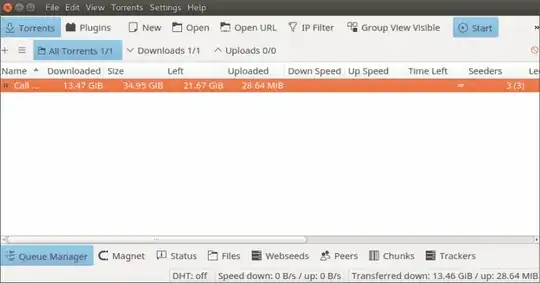You probably want to have a look at vnstat
$ vnstat -d -i wlp3s0
wlp3s0 / daily
day rx | tx | total | avg. rate
------------------------+-------------+-------------+---------------
2017-10-24 166,63 MiB | 37,33 MiB | 203,96 MiB | 19,34 kbit/s
2017-10-25 214,68 MiB | 130,26 MiB | 344,94 MiB | 32,71 kbit/s
2017-10-26 1,01 GiB | 4,09 GiB | 5,10 GiB | 495,31 kbit/s
2017-10-27 1,16 GiB | 113,28 MiB | 1,27 GiB | 123,04 kbit/s
2017-10-28 201,09 MiB | 299,21 MiB | 500,31 MiB | 47,44 kbit/s
2017-10-29 1,92 GiB | 174,35 MiB | 2,09 GiB | 202,92 kbit/s
2017-10-30 559,56 MiB | 69,18 MiB | 628,73 MiB | 59,61 kbit/s
2017-10-31 397,73 MiB | 43,62 MiB | 441,35 MiB | 41,85 kbit/s
2017-11-01 665,81 MiB | 83,05 MiB | 748,86 MiB | 71,00 kbit/s
2017-11-02 282,20 MiB | 239,91 MiB | 522,11 MiB | 49,50 kbit/s
2017-11-03 4,06 GiB | 4,85 GiB | 8,92 GiB | 865,61 kbit/s
2017-11-04 220,95 MiB | 40,12 MiB | 261,07 MiB | 24,75 kbit/s
2017-11-05 320,91 MiB | 8,86 GiB | 9,18 GiB | 890,93 kbit/s
2017-11-06 639,67 MiB | 13,77 GiB | 14,39 GiB | 1,40 Mbit/s
2017-11-07 694,91 MiB | 80,48 MiB | 775,39 MiB | 73,52 kbit/s
2017-11-08 178,64 MiB | 32,43 MiB | 211,07 MiB | 28,97 kbit/s
------------------------+-------------+-------------+---------------
estimated 257 MiB | 46 MiB | 303 MiB |
You can have hourly daily and monthly statistics.
